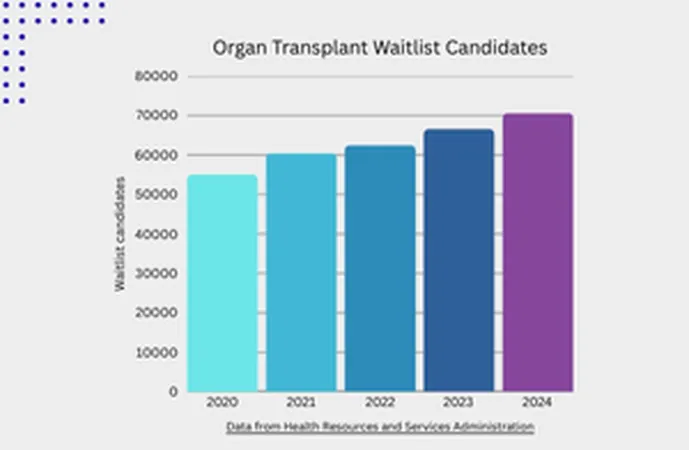
Revolutionary Pig Lung Transplant: A Groundbreaking First!
2025-09-04
Author: Jia
A Milestone in Transplant History
In an astonishing medical breakthrough, scientists at Guangzhou Medical University have successfully transplanted a genetically modified pig lung into a brain-dead man, marking the first instance of a pig lung being used in a human transplant. This groundbreaking achievement was recently reported in *Nature Medicine*.
The Experiment Details
The lung, engineered with six modified genes, was transplanted into a 39-year-old brain-dead patient. Despite sustaining some damage during the procedure, the organ demonstrated partial functionality post-transplant. However, only the left lung was transplanted, leaving the critical question: could this lung independently sustain life?
Early Signs of Rejection
Three days after the transplant, researchers noted indications of antibody-mediated rejection, a common threat in transplantation. Fluid accumulation within the lung posed additional concerns, leading to its removal after nine days. Remarkably, the lung managed to function during this observation period and showed signs of partial recovery from rejection by day nine.
The Challenges of Lung Transplants
Lung transplants are notoriously precarious due to the organ's rich immune cell content, which heightens the risk of rejection compared to other solid organs. In human-to-human transplants, lungs typically last between five to seven years, while kidneys can function for 12 to 14 years. According to the Mayo Clinic, only about half of lung transplant recipients survive five years post-procedure.
A Dire Need for Donors
The demand for organ transplants is staggering, with over 103,223 individuals on the national waiting list, and a new name added every eight minutes. In 2024, there were just 24,019 donors—both deceased and living—available to meet the needs of nearly 70,634 candidates. The hope is that genetically modified organs from animals could bridge this critical gap.
The Future of Organ Transplants
In addition to pig organs, research is advancing in the realm of growing human organs in animal models, such as mice and pig embryos. In a fascinating development, human hearts have survived for up to 21 days within pig embryos and even begun to beat, showcasing a promising direction in medical science.




 Brasil (PT)
Brasil (PT)
 Canada (EN)
Canada (EN)
 Chile (ES)
Chile (ES)
 Česko (CS)
Česko (CS)
 대한민국 (KO)
대한민국 (KO)
 España (ES)
España (ES)
 France (FR)
France (FR)
 Hong Kong (EN)
Hong Kong (EN)
 Italia (IT)
Italia (IT)
 日本 (JA)
日本 (JA)
 Magyarország (HU)
Magyarország (HU)
 Norge (NO)
Norge (NO)
 Polska (PL)
Polska (PL)
 Schweiz (DE)
Schweiz (DE)
 Singapore (EN)
Singapore (EN)
 Sverige (SV)
Sverige (SV)
 Suomi (FI)
Suomi (FI)
 Türkiye (TR)
Türkiye (TR)
 الإمارات العربية المتحدة (AR)
الإمارات العربية المتحدة (AR)